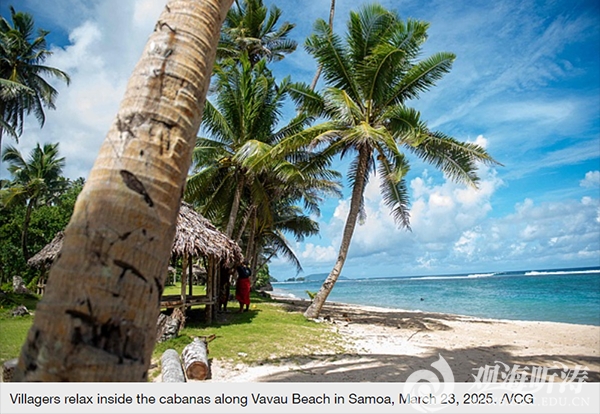


Editor's Note: Li Jianping is the Dean of the Academy of Future Ocean and Director of Center of Ocean Carbon Neutrality at Ocean University of China. The article reflects the author's opinions and not necessarily those of CGTN.
China and the Pacific Island Countries (PICs) have achieved fruitful cooperation outcomes, becoming an excellent model of South-South cooperation with mutual benefit and win-win results.
From 1992 to 2024, the total trade volume between China and the PICs with diplomatic relations increased from $153 million to $7.5 billion, a 49-fold increase. As of the end of 2024, China has provided over 4.5 billion Chinese yuan (about $625 million) in development assistance to 11 island countries with diplomatic relations, with a focus on three major areas: climate change response, healthcare system construction, and digital infrastructure upgrading.
From a maritime perspective, China and the PICs share highly compatible strategic interests, paving the way for robust cooperation. The two sides share common aspirations, interests, responsibilities and goals, creating ample room for cooperation. For example, the construction of the southern route of the China-proposed 21st-century Maritime Silk Road initiative is highly compatible with the PICs' 2050 Strategy for the Blue Pacific Continent.
Specifically, both sides can achieve deep cooperation and win-win outcomes through the development of blue economy (fisheries and aquaculture, blue seed industry, marine tourism), marine environmental protection (addressing climate change, ocean pollution control), island marine spatial planning and construction of marine infrastructure (island disaster prevention and reduction, island ecological restoration, island in-situ energy supply, port construction, maritime interconnection), maritime security and cooperation (maritime search and rescue cooperation, maritime rights maintenance), marine scientific and technological innovation, and exchange and cooperation of marine culture, etc.
Both sides need to establish mechanisms for blue governance and blue cooperation to ensure mutual benefits and win-win outcomes by deepening collaboration within the current international ocean governance framework.
The first thing is to coordinate multilateral mechanisms, comply with the framework of the United Nations Convention on the Law of the Sea (UNCLOS), and oppose maritime hegemony and unilateralism.
The second is technical cooperation and capacity building to help island countries achieve economic independence and enhance their disaster prevention and mitigation capabilities.
The third is the innovation of financing mode. Through the Asian Infrastructure Investment Bank (AIIB) or small yet smart assistance programs (such as solar microgrids), the aim is to help people in partner island countries improve their income and livelihood, reduce the debt risk and put an end to resource plundering.
The fourth is to deepen the talent cultivation mechanism – helping island countries cultivate talent through various means.
However, in the complex international context and reality, China and the PICs also face common challenges in their cooperation in maintaining maritime security and stability in the Pacific region, such as marine environmental protection and maritime emergency rescue.
The first challenge is the interference of geopolitical games. Western external forces such as the United States either attempt to build an exclusive maritime security mechanism in the Pacific region, excluding China, or use means such as public opinion smearing and political pressure to interfere with and undermine the normal cooperation between China and the PICs, affecting the improvement of the level of cooperation between the two sides.
The second challenge is the impacts of climate change, such as an increase in extreme weather and climate events, frequent marine disasters, sea level rising, ocean acidification, etc., which put higher demands on marine environmental protection, increase the difficulty and cost of maritime emergency rescue, and seriously affect the abundance of fishery resources. It is necessary to enhance the ability to respond to climate change and disaster prevention and reduction.
The third challenge is the constraint of resources, technology, and capabilities.
The PICs generally face challenges such as limited resources and technological gaps, insufficient infrastructure, underdeveloped maritime rescue systems, and inadequate capacity for marine environmental monitoring and governance. Increased investment in resources and technical support is needed to strengthen their capacity-building efforts in these areas.
Regardless of how the international landscape evolves or what challenges may arise, China will continue to stand side by side with the PICs. In October 2021, the regular mechanism of the China-PICs Foreign Ministers' Meeting was officially established, creating an important platform for China to enhance dialogue, build mutual trust, and promote cooperation with the PICs. This is highly significant in building a closer community with a shared future between China and the PICs.
Looking at development trends, future cooperation in the marine sector between China and the PICs will focus on strengthening the blue partnership, deepening exchanges and collaboration in marine science and technology, enhancing blue cooperation, improving marine infrastructure, boosting strategic trust in maritime affairs, and advancing sustainable development.
By continuously innovating the model of South-South cooperation, deepening engagement in international and regional affairs, exploring emerging fields, and driving technological innovation, both sides will expand and implement cooperation in addressing climate change, ensuring maritime security and peace, promoting multilateralism, and enhancing maritime governance.
Key areas of focus include political and maritime security, climate change mitigation, the marine economy and development, sustainable governance of marine resources, blue carbon cooperation, disaster prevention and reduction, healthcare, poverty alleviation, marine technology innovation, and talent development.
Looking ahead, as the China-PICs Foreign Ministers' Meeting mechanism continues to deepen, cooperation between China and the PICs will achieve higher quality, more advanced, and more comprehensive development. It will enter a new era of win-win blue cooperation and play an increasingly important role in maintaining peace and stability in the Asia-Pacific region while fostering growth and prosperity for all.
新闻链接:【CGTN】China and Pacific Island countries: Path to win-win marine cooperation